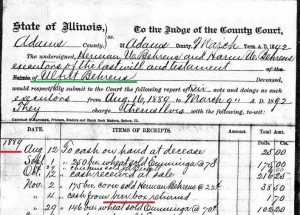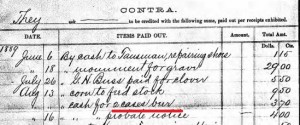 There it is in his estate settlement: proof that Ulfert Behrens drank beer.
There it is in his estate settlement: proof that Ulfert Behrens drank beer.
On 11 November 1889 the executor of the will of Ulfert Behrens received $1.70 for the return of a beer box.
There is also an amount paid out on 13 August 1889 for two cases of beer ($2.70). 
Is that “proof” that Ulfert drank beer?
That all depends upon how one defines proof, evidence, and information.
The probate accounting is a source because it provides information. It provides information about many things, not just the purchase of beer and the return of beer boxes.
The images made in this post were made from the digital images of the probate records at Ancestry.com which in turn were made from the microfilm copies of the probate records held by the Family History Library and actually made by the Genealogical Society of Utah. The actual records are housed at the Adams County Courthouse in the office of the Adams County, Illinois, Circuit Clerk in Quincy, Illinois. Practically speaking, most would consider the image “original,” although technically the piece of paper on file in the clerk’s office is the true “original.” These are actually image copies which usually are considered equivalent to the original. Any transcription I make of the record would be derivative, because it was derived from the actual record. Calling my transcription derivative is not meant in a derogatory fashion. It is simply done to indicate that it’s not the original record.
I suppose if one wanted to be really technical, this accounting is not truly”original” for the two beer transactions. The original record would be any receipt the executors of the estate were given for these transactions. Those receipts are not in the probate packet and there’s no reason to doubt the accuracy of the items.
The statements about the return of the beer box and the purchase of the cases of beer would likely be considered primary information as the executor most likely had first hand knowledge of the return of the beer box and the purchase of the cases of beer. That first hand knowledge is what makes the information primary.
Now if one would conclude that the two beer items mentioned indicate that Ulfert Behrens drank beer upon occasion, then we would consider those two statements evidence to support that conclusion. Evidence is either direct or indirect. These statements don’t specifically say “Ulfert drank beer,” so I would be inclined to say that they are indirect evidence of Ulfert’s inclination to drink beer.
My proof is not in these statements (the ones about the beer purchase and the beer box return). My proof would be my written up conclusion wherein I use these two pieces of information to “make my case.” It turns out that my case may not be as solid as the beer case that was returned on 11 November.
I read the rest of the probate file. There’s a reason why genealogists talk about putting information in context, reading the entire file, using all the information, etc. It’s to avoid jumping to conclusions.
There was a sale of Ulfert’s chattel property on 12 October 1889. It was not unheard of to have alcohol at auctions. Is it possible that’s what the beer was for, consumption at the auction? The purchase of the two cases of beer was about a month before the auction and the beer box was returned on 11 November, a month afterwards.
Then I go back and look. Ulfert died on 8 August 1889. That’s before both beer transactions.
It is duly noted that the 13 August 1889 payment for beer does not mean the beer was acquired on that date. It’s possible it was obtained some time before 13 August 1889 while Ulfert was still alive.
So what do I have?
What I have is primary information about two beer transactions. When I fit them in the chronology of other events, I may not have evidence of Ulfert’s beer drinking at all. And if I don’t have evidence of Ulfert’s beer drinking then I don’t have proof.
Had it been whiskey transactions, then I would have had more proof 😉
————
Note: Evidence Explained is my guide to terminology. I don’t think there are any citation examples for the purchases of alcohol, but I may have missed them.
There’s not a citation in this example, but the information was taken from the executor’s report filed 9 March 1892. Ulfert’s probate papers are located in estate case file box 276 and letters were issued to his executors, Herman and Harm Behrens, on 16 August 1889.
And that means they were paying for the beer even before their appointment as executors was official.

2 Responses
My guess, given the dates (and also speaking from recent personal experience) would be that the two cases of beer were purchased to provide for the guests at Ulfert’s funeral or memorial service – fair expenses to be charged to the estate. I needed to obtain a (1-day) liquor license in order to serve wine legally at my husband’s memorial service, though I never consume alcohol. I hope my heirs don’t jump to any conclusions about their great-great granny having drowned her sorrows in wine!
That’s a good point about the funeral which I had not considered. I really wanted people to see how easy it could be to jump to the wrong conclusion if one isn’t careful.